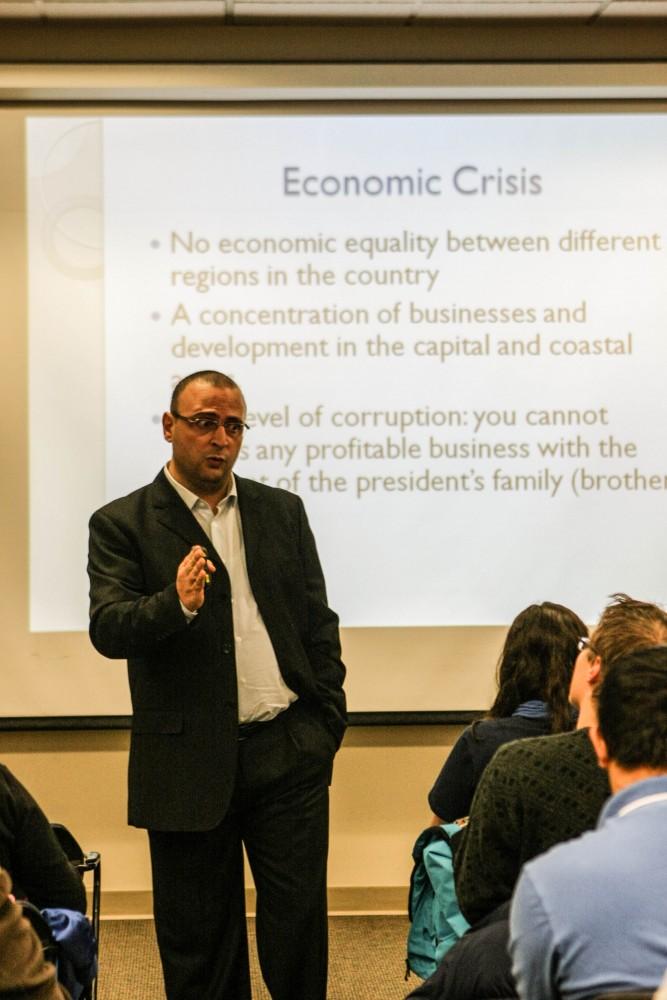Educating GVSU students on Arab culture

GVL / Kaitlyn Bowman Dr. Sofiene Malouli, from the University of Sfax, Tunisia, speaks on the Arab Spring.
Nov 11, 2012
On Nov. 8 and 9, Grand Valley State University students traveled to the Middle East and North Africa – or at least they pretended they did.
The International Student Organization, Padnos International Center and the Arab Culture Club put together Arabian Nights, a two-day event that educated students about Arab cultures in different countries as well as the Arab Spring in an attempt to eliminate stereotypes and biases associated with Arabian cultures.
Thursday night featured guest speaker, Dr. Sofiene Malouli, a professor at the University of Sfax in Tunisia. Dr. Malouli gave his lecture, “The Arab Spring: A Different Story for Each Country” and allowed students to ask questions afterwards. Malouli said that the revolution allowed him to become more involved within his own university, and students here in America should be more exposed to the Arab revolution and how it is affecting the rest of the world.
“These revolutions are not exceptional, but they are part of a long standing tradition of people trying to win back their dignity and live freely,” Malouli said. “We long for democracy much like the rest of the world. We hope that during this event people can get to know us better.”
Since the revolution, Malouli has helped found the Tunisian Association of Teachers of English, which is a forum of teachers that attend conferences and receive training as well as giving back to the community by reaching out to underprivileged students, an organization that he would not have had the chance to form prior to the revolution.
Over 100 Grand Valley students attended the first night to hear Malouli’s presentation.
Friday was the more cultural night where around 100 students got the opportunity to try many different recipes from different countries, play games, win prizes, and interact with students from all over the Middle East and North Africa. Different tables represented five countries; Egypt, Saudi Arabia, Lebanon, Jordan, and Tunisia. Students voted for the table they think was represented best, the winner being Saudi Arabia. A panel of students from each country was also constructed for a Q&A style discussion about partying, dating, food and everyday life in the Arab culture. During the event students were also exposed to Middle Eastern and North African music.
“I think this event is amazing,” said Alexia Mangala, who is an international student from the Congo. “I am learning new things that I didn’t know about the cultures before and I also learned that some things I thought were true were actually not true.”
First year international student Adesinmibola Olabode of Nigeria was also astounded by the event.
“I love it here at Grand Valley so far and it is really fun. Seeing people from different cultures is amazing,” Olabode said.
Ahmed Lachheb, president of the International Student Organization, initially created Arabian Nights. Lachheb came to Grand Valley three years ago as an international student from Tunisia. Lachheb invited Malouli to speak with the students because he felt that the hearing about the Arab Spring from a primary source would be more beneficial and a “more authentic perspective.”
Lachheb also created the event to educate students and eliminate stereotypes about the Arab culture.
“There is so much going on and so much stereotyping,” Lachheb said. “Our hope was for students who come to go home with a good message about the Arab world. We are not terrorists. We are not angry. We are human beings and we have our own cultures and traditions.”
Lachheb encourages Grand Valley students to learn more about the Arab Spring so they can be better educated when competing globally because it is affecting the world both directly and indirectly.
Lachheb says that the title for the event, Arabian Nights, was no coincidence and chosen absolutely on purpose.
“We chose this title because it is so stereotypical and we in turn wanted students to come and break these stereotypes,” Lachheb said.
[email protected]






















